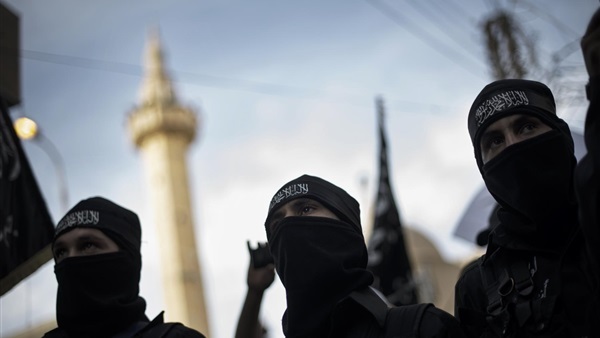The new ISIS leader inherited a strong organization: Dutch study

A Dutch study confirmed that Abu Bakr al-Baghdadi, the
former leader of the ISIS terrorist organization, had a personality that
managed to transform a security organization into a militant army that
controlled many provinces and cities for nearly four years.
The study by Adham Karam, published by the European Center
for Counterterrorism and Intelligence Studies on Monday, November 4 under the
title “After the Killing of Baghdadi: ISIS and the Perpetual War”, said that
while the killing of Baghdadi is a severe blow to ISIS as a whole, especially
after it had already passed through a military and logistical collapse following
its loss of its “caliphate” territory, this does not mean the organization’s
end.
Karam explained that ISIS is an ideological extremist
organization whose pillars are strengthened and supported by extremist
religious ideas, adding that it may be affected a little or a lot by the death
of one of its leaders, but the intellectual and ideological structure will
generate a new leadership that appears publicly.
ISIS and al-Qaeda
Attempts by al-Qaeda, led by Ayman al-Zawahiri, to exploit
ISIS’s situation following Baghdadi’s death may emerge by inviting or co-opting
some of the ISIS leaders to return to the parent organization, Karam explained.
He pointed out that previous intelligence indicators
confirmed the occurrence of meetings in Syria between leaders of ISIS and al-Qaeda,
adding, “The killing of Baghdadi was in the village of Barisha, specifically
inside the house of Abu Mohammed al-Halabi, a well-known leader of the al-Qaeda-affiliated
organization Hurras al-Din (Guardians of the Religion), which is hostile to the
ISIS terrorist organization, confirming the rapprochement and theoretical harmony.”
According to the study, Baghdadi’s presence likely means one
of two things. One is confirmation of the existence and continuation of
negotiations and understandings between ISIS and al-Qaeda to reconcile and
unite their fronts, or even Zawahiri pledging allegiance to Baghdadi by means
of Halabi.
The other is Halabi’s allegiance Baghdadi and joining the
ranks of ISIS, especially as he sheltered the ISIS leader in his house and was
killed with his family during the attack by US forces.
The collapse of ISIS does not mean its end
ISIS is not the same organization it was in 2014 in all aspects,
including “financial, logistical, leadership, propaganda and organizational,” according
to Karam, who explained that ISIS lost a lot of its leadership and wealth by
losing the land it controlled in Iraq and Syria. He pointed out, that dispersed
groups currently operate in a decentralized manner and often unable to launch
attacks as deadly as before.
Despite all the defeats suffered by the organization, which
culminated in Baghdadi’s death, it cannot be said that ISIS has been eliminated,
the study stressed, pointing out that the balance may be disrupted again and
the organization could expand as before, especially with the survival of its
terrorist cells in many Iraqi and Syrian provinces, in addition to the presence
of terrorist organizations in Asia and Africa that still adhere to their allegiance.
According to the study, the difficulty of eliminating the
organization comes from the fact that it has a flexible ideological and organizational
structure that can adapt to variables. What enhances the organizational status
of its cells is the acquisition of combat, military and security experience
during the previous years.
It can be said that the organization is going through its
worst stages, the study explained, but what prevents its elimination is its
sectarian ideology that was and continues to feed the pillars of its survival,
which include “intellectual, organizational, propaganda, security, military and
moral,” stressing that this requires comprehensive and tremendous efforts in
all political, security, educational and economic aspects.
The study ruled out any radical changes to the structure of
the organization at the present time, especially since the terrorist cells
deployed in Iraq and Syria work in a decentralized manner, rely on their field
capabilities, and are trying to find alternatives to finance themselves. Also,
they do not communicate with the governors or top leaders except with great
difficulty and after long periods of time.
Important stage
According to Karam, the current period may represent a very
important and sensitive stage for the fight against terrorism. He stressed that
this stage could weaken the organization a lot, eliminate it, or enter it into
a dormancy that could extend for several years.
He stressed that all intelligence efforts must be used to
collect and analyze information about the new terrorist leadership in all respects,
so as to eliminate it or exploit the weaknesses in the new leadership
structure, and to attempt to penetrate them and capture a large number of
them.
Karam stressed that the combat and offensive capabilities of
the organization and its terrorist cells should not be underestimated,
especially in Iraq, despite its disintegration and weakness. He pointed out
that the organization is still launching attacks, although not very
effectively, with up to five attacks a day across the country. In addition, it
is not undeniable that Baghdadi's successor will inherit, albeit weak, an
organization that may be stronger than the former leader had received in
2010.
US President Donald Trump announced in a speech on Sunday,
October 27 the death of Baghdadi in a military operation carried out by US
forces in Idlib, northern Syria, after the terrorist leader detonated a suicide
vest for fear of capture.
On Thursday, October 31, ISIS confessed to the killing of
Baghdadi and Abu Hassan al-Muhajir, the group's second-in-command, and
announced the appointment of Abu Ibrahim al-Hashimi al-Qurashi as Baghdadi’s
successor, with Abu Hamza al-Qurashi as his spokesman.





